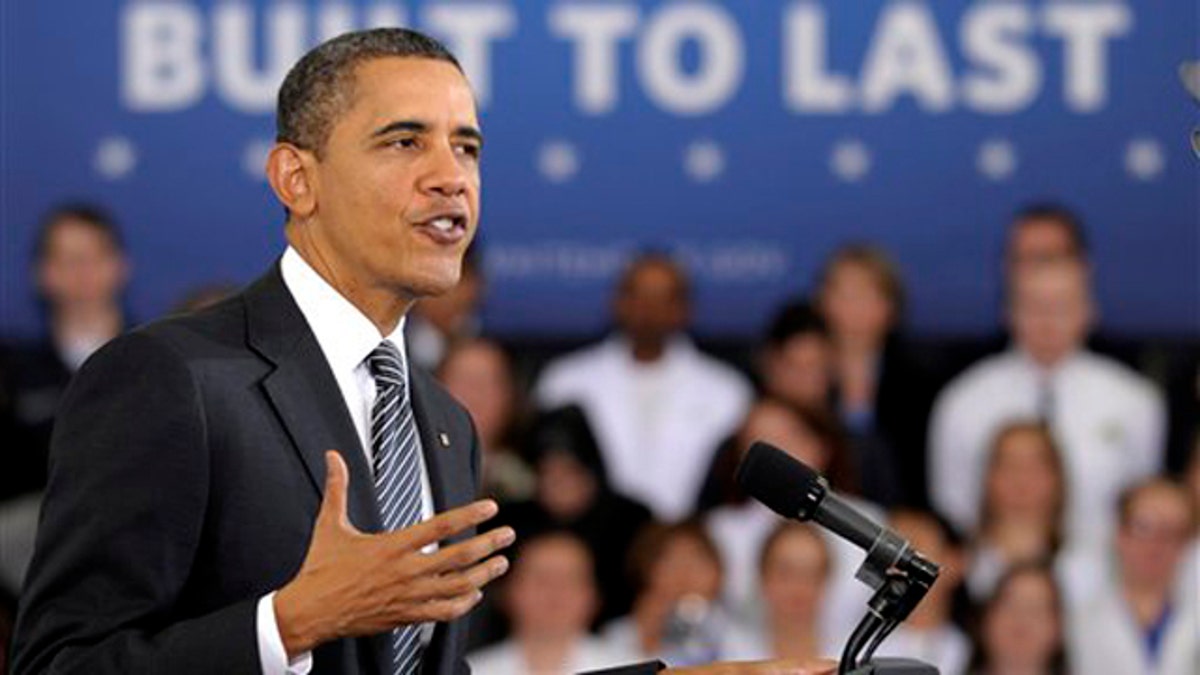
Feb. 13, 2012: President Obama discusses his 2013 budget at Northern Virginia Community College in Annandale, Va. (AP)
President Obama's proposed 2013 budget contains a decade-long surge of tax hikes that, if approved, would affect everything from income to investment to inheritance.
The budget blueprint contains roughly $2 trillion in new taxes and fees. When other tax cuts and credits are counted, the net impact from the proposals is still about $1.5 trillion.
Though Republicans already are mounting a vigorous campaign against the proposal, many of the tax provisions still could become law unless Congress takes action to stop them.
At the top of that list is the expiration of the tax cuts approved during the George W. Bush administration. They're scheduled to expire at the end of 2012, and the White House estimates that letting them lapse, at least for households making more than $250,000, could pump $968 billion into the federal coffers over the next decade.
Allowing those rates to expire, as Obama's budget proposes and as current law would allow absent intervention, would mean the following changes:
-- For households making more than $250,000 and individuals making more than $200,000, the top income tax rate would rise from 35 percent to 39.6 percent.
-- For those same households, the top rate on qualified dividends would rise from 15 percent to 39.6 percent.
-- The top rate on long-term capital gains would rise from 15 percent to 20 percent.
-- The estate tax, known disparagingly as the "death tax," would rise to 45 percent from 35 percent.
The hike in investment income tax for top earners, though, would be compounded by another surcharge included in the federal health care overhaul. That 3.8 percent surtax would bring the top dividend rate to 43.4 percent. The top capital gains rate would, likewise, be 23.8 percent.
Along the same lines, the budget plan would make sure hedge fund managers and others pay an ordinary income tax rate for what's known as "carried interest" -- or profits, in the investment world -- instead of the 15 percent rate. That's projected to bring in another $13 billion over the next decade.
Aside from those changes, the budget calls for implementing the so-called Buffett Rule. This would ensure that every household making more than $1 million pays at least 30 percent of their income in taxes.
The budget also cuts the value of itemized deductions to a 28 percent rate for households making more than $250,000. That would cover popular deductions like the mortgage interest deduction and charitable deductions -- and it's projected to raise $584 billion over 10 years.
The bulk of the changes are aimed at upper-income earners. The budget, for instance, reprises an older plan to end preferential treatment for corporate jet owners. It also calls for ending oil and gas company tax "preferences," projected to raise $41 billion.
But the budget also imposes various fees, such as a hike in the airline "security fee," as well as a $61 billion-over-10-years fee on financial institutions. The fee is called the "financial crisis responsibility fee," and is aimed at making sure taxpayers are compensated for the 2008 industry bailout.
Separately, the Obama administration is working on a plan to potentially lower the country's 35 percent corporate tax rate. The Obama administration, in releasing the budget, called for simplifying the tax code in exchange for lowering tax rates.
The administration also claims that combined with spending cuts, the budget blueprint would lock in $4 trillion in deficit savings.
But Republicans have decried several of those supposed cuts as "gimmicks," such as savings counted from winding down the wars in Iraq and Afghanistan. GOP lawmakers claim the plan relies far too heavily on tax increases -- and still doesn't do enough to rein in the deficit, considering deficits would still rise by $6.6 trillion over the next 10 years.
"There is absolutely no way that you can argue that raising taxes in the middle of an economic downturn will do anything but cost this economy jobs," Sen. John Thune, R-S.D., said Tuesday. "So it wasn't a serious effort. It shouldn't be taken seriously. I hope that the president will recognize the error of his ways and work with us to do something that will meaningfully address the spending, debt crisis that we're facing in this country, and the importance of getting people back to work and growing the economy."
White House Press Secretary Jay Carney, though, described the budget as a "bold proposal."
Carney said Monday that it achieves deficit reduction through "a combination of entitlement reductions and ... revenue increases, asking that those who have done exceptionally well over the last 10 years, the wealthiest Americans pay a little bit extra, pay their fair share, and it does it through sensible, wise reductions in defense spending and discretionary spending."
On the sidelines, the Obama administration is pushing for Congress to extend the payroll tax cut through the end of the year -- congressional negotiators appeared to be making progress toward a potential deal, though that cut too would expire at the end of 2012.
The Obama budget, while raising taxes on top earners in myriad ways, also includes tax breaks for lower- and middle-class families and small businesses.
Among those provisions are a continuation of a policy allowing businesses to write off the full value of new investments, and a new credit giving employee-hiring businesses a 10 percent cut for new wages up to $500,000.




